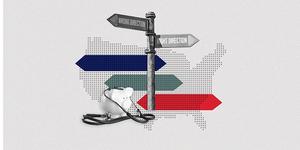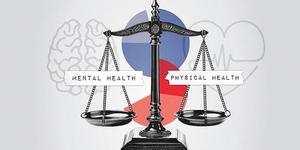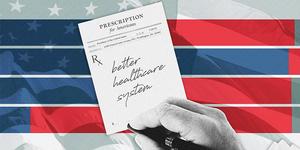West Health-Gallup Research
Explore Gallup's research.

Four in 10 Americans say they are overweight, and 52% want to lose weight. Yet only half as many are trying, with women expressing more desire.

Twenty-nine percent of U.S. adults describe their mental health as excellent, down 14 points from 2019 and the first reading below 30%.

Concerns about and dissatisfaction with healthcare costs in the U.S. underscore Americans' belief that the nation's healthcare system is highly flawed.

Roughly four in 10 U.S. adults — equivalent to nearly 110 million Americans — doubt Medicare and Social Security will be available in 10 years, and a majority say benefit changes worry them more this year than last year.

Americans' approval of the Affordable Care Act has risen to a new high, fueled by increased support among political independents.

West Health and Gallup developed a system to rank all 50 states and D.C. based on residents' experiences with healthcare cost, quality and access.

New state rankings from West Health-Gallup reveal sizable differences in residents' experiences of healthcare cost, quality, and access and an urgent need for improvement in every U.S. state.

A West Health and Gallup survey finds that 11% of U.S. adults are unable to pay for needed healthcare and prescribed medicine, marking a new high in a four-year trend.

After sliding over the past decade, Americans' reports of their own mental and physical health held steady last year at the lowest levels in Gallup's 24-year trend.

Twelve percent of Americans report borrowing an estimated $74 billion to pay for healthcare expenses last year. More than one-quarter (28%) report being "very concerned" that a major health event could put them in medical debt in the future.

Americans are divided over President-elect Trump's policies for lowering healthcare costs. Views vary by political affiliation, but by two to one, independents think the policies take the U.S. in the wrong direction.

Americans' positive rating of the quality of healthcare in the U.S. has fallen to its lowest point in Gallup's trend dating back to 2001.

Seven in 10 Americans say they would prefer that primary care providers ask about both mental and physical health concerns during appointments.

Nearly eight in 10 Americans, including majorities of Democrats and Republicans, favor a federal law requiring equal insurance coverage for mental and physical healthcare.

Healthcare retains its place as one of the higher-ranking issues voters say are influencing their vote this year.

A new poll from West Health and Gallup shows that a majority of Americans think healthcare is not receiving enough attention in the 2024 presidential election.

West Health and Gallup report that Americans see a significant need for affordable healthcare, housing and social services as they age.

The percentage of U.S. adults classified as "cost secure" has slipped to 55%, a new low. The biggest drop is among those aged 50 and older.

Worries that Medicare and Social Security will no longer be available in the future run high, especially among adults closer to the age of eligibility.

Most Americans say care for mental health issues is not on par with care for physical issues. Cost and access are seen as the top barriers to treatment.